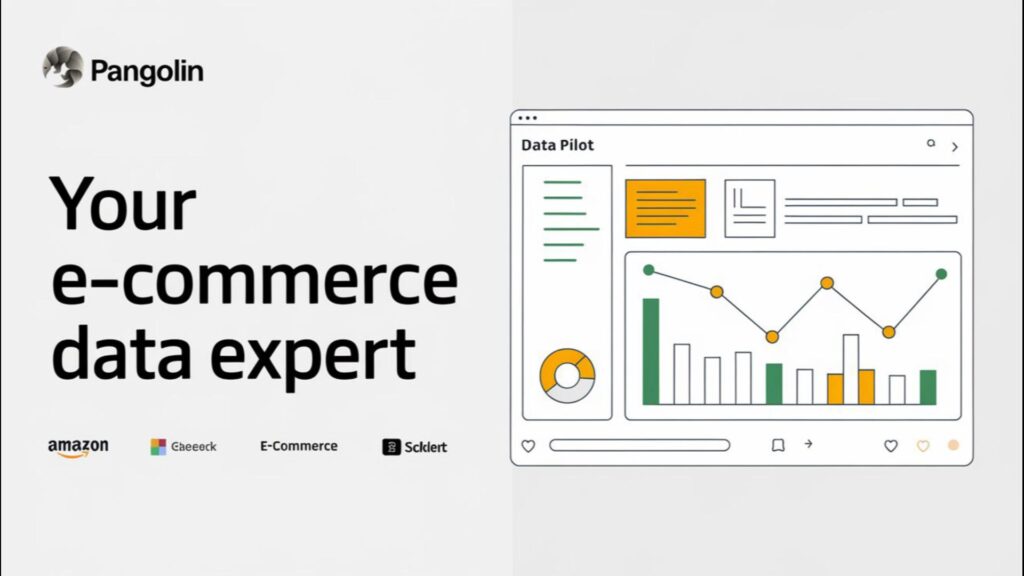Introduction: The Importance and Challenges of E-commerce Data
In today’s e-commerce landscape, data has become the key to success. Every decision, from product selection to advertising campaigns, from customer experience to post-sales management, relies on accurate and timely data. However, despite the growing availability of e-commerce data tools, many sellers still face significant challenges. Most existing data solutions offer standardized insights that don’t meet the personalized needs of individual sellers. Additionally, data timeliness remains a problem, as many sellers struggle to keep up with rapidly changing markets, especially when real-time decisions are needed.
To help sellers overcome these issues, Data Pilot was created. As a smart data tool designed specifically for e-commerce sellers, Data Pilot offers personalized data access and supports near real-time updates, empowering sellers to make accurate decisions in the shortest possible time. This article will explain how Data Pilot addresses the need for personalized data and real-time updates while demonstrating its powerful functionality in practical use cases.
1. The Pain Points in E-commerce Data Access
1.1 Difficulty in Meeting Personalized Data Needs
In e-commerce operations, each seller has different needs, especially when it comes to selecting data fields. Some sellers focus on product dimensions, listing times, or ad placement, while others may require specific data on keyword rankings or customer reviews. Unfortunately, many existing data tools only provide standardized reports, which often fail to meet these personalized requirements. Sellers who need more customized fields are typically forced to either develop their own data extraction tools or rely on complex third-party solutions, which can be both costly and difficult to manage.
1.2 Lack of Data Timeliness
The fast-paced nature of e-commerce markets demands that sellers have access to the latest data. However, most existing tools update on a weekly or daily basis, which doesn’t provide the level of timeliness that some sellers need. This delay can lead to missed market opportunities, especially in areas like ad spending, product selection adjustments, and pricing strategies. Without real-time data, a seller’s operational decisions can become outdated, negatively impacting sales performance.
1.3 Dispersed Data Sources and Difficult Integration
E-commerce operations require pulling data from a variety of sources, such as product pages, customer reviews, bestseller lists, and advertising metrics. Sellers often have to manually extract, combine, and analyze this data from multiple platforms, which is time-consuming and prone to errors. For small to medium-sized sellers with limited resources, this tedious process can become overwhelming.
2. Data Pilot: Personalized E-commerce Data Access
2.1 Customizable Report Headers
One of the core features of Data Pilot is its ability to provide customizable report headers. This feature allows sellers to select the specific data fields they need and generate reports tailored to their requirements. For example, sellers can choose fields such as keyword rankings, ad placements, customer reviews, and product dimensions based on their business needs. This flexibility eliminates the limitations of standard reports, enabling sellers to create personalized reports that are aligned with their unique operational goals.
This customizable feature is particularly valuable for sellers who need specific data to support their operations. For instance, a seller focused on optimizing ad campaigns can select relevant ad data fields to generate a comprehensive report on ad performance. Similarly, a seller interested in monitoring customer reviews and keyword rankings can configure the necessary fields to generate a customized analysis report.
2.2 Cross-Page Data Analysis
In addition to customizable headers, Data Pilot supports data extraction from different types of Amazon pages, which can be combined into a single report for cross-page analysis. Sellers can pull data from bestseller lists, keyword analysis, review sections, and more, and then merge these datasets for a comprehensive, multi-dimensional view of their product performance. This ability to combine data from multiple pages helps sellers gain more insights and respond to market trends more accurately.
For example, a seller can gather data on a product’s performance in the bestseller list, analyze customer search behavior with keyword data, and examine customer feedback through reviews. By cross-referencing these different data points, sellers can better understand market demand and refine their operational strategies.
3. Data Pilot’s Near Real-Time Data Update Feature
3.1 Accessing Data in Seconds
In addition to providing personalized data reports, Data Pilot also supports near real-time data updates. Compared to traditional e-commerce tools, Data Pilot delivers the latest market data within minutes, enabling sellers to make faster and more informed decisions. This near real-time capability is particularly critical in e-commerce, where quick reactions are essential for success in areas like product selection, advertising optimization, and inventory management.
For example, if a seller notices an unexpected change in ad performance, they can use Data Pilot’s near real-time data update feature to quickly retrieve the most up-to-date ad performance metrics and adjust their strategy accordingly, preventing unnecessary waste of ad spend. Similarly, during the product selection process, sellers can immediately respond to market demand by accessing real-time bestseller data and adjusting their inventory.
3.2 Comparison with Traditional Tools
Most existing e-commerce tools suffer from delayed data updates, leaving sellers at a disadvantage when fast decisions are required. Data Pilot, however, meets the needs of sellers who rely on timely, accurate data. Whether it’s large-scale sellers who adjust their operational strategies daily or small to medium-sized sellers who need to respond quickly to market shifts, Data Pilot provides the necessary real-time insights to stay ahead of the competition.
4. Data Pilot Use Cases
4.1 Optimizing Product Selection Strategy
Product selection is one of the most critical aspects of e-commerce operations. The ability to choose the right products to sell can make or break a business. Data Pilot helps sellers optimize their product selection strategies by providing near real-time data from Amazon bestseller lists and keyword search behavior. This enables sellers to quickly identify market trends and act on them. By analyzing this data, sellers can determine which products are trending and which keywords have higher search volumes, allowing them to fine-tune their product selection for maximum profitability.
4.2 Monitoring Ad Campaign Performance
Advertising is one of the primary ways for e-commerce sellers to drive traffic and generate sales. However, many sellers struggle to monitor ad performance in real-time, leading to wasted ad budgets. With Data Pilot’s near real-time data update feature, sellers can quickly access feedback on their ad campaigns and make immediate adjustments. For instance, if a certain keyword is underperforming, sellers can quickly change their bidding strategy to improve ad ROI.
4.3 Operational Monitoring and Report Generation
Throughout daily operations, sellers need to monitor multiple aspects of their business, including inventory levels, orders, and sales performance. Data Pilot allows sellers to generate real-time reports tailored to their specific needs using customizable headers. Sellers can create sales trend reports, inventory alerts, and more with just a few clicks. This automated reporting feature saves time and reduces the manual effort involved in handling data, boosting overall operational efficiency.
5. Who Needs Data Pilot?
5.1 Small to Medium-Sized E-commerce Sellers
Small and medium-sized e-commerce sellers often lack the technical development capabilities needed to handle complex data integration and analysis tasks. Data Pilot, with its user-friendly interface, allows sellers to access personalized operational data without any technical expertise. This low barrier to entry makes Data Pilot an ideal solution for small to medium-sized sellers, helping them streamline data management and analysis processes.
5.2 Sellers with High Data Timeliness Requirements
Some e-commerce sellers rely on real-time data to make critical decisions in areas such as product selection, advertising, and inventory management. Data Pilot’s near real-time data update feature provides these sellers with the powerful data support they need to stay on top of the latest market trends and make fast decisions. This ensures that sellers are always working with the most up-to-date information, reducing the risk of missed opportunities.
5.3 Sellers with Custom Data Needs
Sellers who need specific data fields, such as those monitoring keyword rankings or ad placement performance, often struggle to find standard reports that meet their needs. Data Pilot’s customizable report headers allow sellers to configure the data fields they need, enabling them to generate reports tailored to their operational goals. This flexibility is perfect for sellers who require detailed, specific insights to optimize their business strategies.
6. Conclusion
As an e-commerce data tool designed specifically for sellers, Data Pilot stands out with its personalized data access and near real-time data update features. By using Data Pilot, e-commerce sellers can streamline their data workflows, optimize their product selection strategies, enhance advertising effectiveness, and generate tailored operational reports quickly and easily.
CTA
The powerful Data Pilot is launching soon. Stay tuned for more details!





